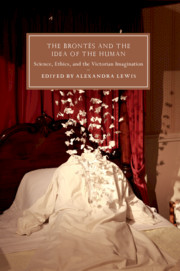Book contents
- The Brontës and the Idea of the Human
- Cambridge Studies in Nineteenth-Century Literature and Culture
- The Brontës and the Idea of the Human
- Copyright page
- Contents
- Figures
- Contributors
- Abbreviations
- Introduction Human Subjects
- Chapter 1 Hanging, Crushing, and Shooting
- Chapter 2 Learning to Imagine
- Chapter 3 Charlotte Brontë and the Science of the Imagination
- Chapter 4 Being Human
- Chapter 5 Charlotte Brontë and the Listening Reader
- Chapter 6 Burning Art and Political Resistance
- Chapter 7 Degraded Nature
- Chapter 8 ‘Angels … Recognize Our Innocence’
- Chapter 9 ‘A Strange Change Approaching’
- Chapter 10 ‘Surely Some Oracle Has Been with Me’
- Chapter 11 Jane Eyre, A Teaching Experiment
- Chapter 12 Fiction as Critique
- Chapter 13 We Are Three Sisters
- Bibliography
- Index
- Cambridge Studies in Nineteenth-Century Literature and Culture
Chapter 7 - Degraded Nature
Wuthering Heights and the Last Poems of Emily Brontë
Published online by Cambridge University Press: 22 May 2019
- The Brontës and the Idea of the Human
- Cambridge Studies in Nineteenth-Century Literature and Culture
- The Brontës and the Idea of the Human
- Copyright page
- Contents
- Figures
- Contributors
- Abbreviations
- Introduction Human Subjects
- Chapter 1 Hanging, Crushing, and Shooting
- Chapter 2 Learning to Imagine
- Chapter 3 Charlotte Brontë and the Science of the Imagination
- Chapter 4 Being Human
- Chapter 5 Charlotte Brontë and the Listening Reader
- Chapter 6 Burning Art and Political Resistance
- Chapter 7 Degraded Nature
- Chapter 8 ‘Angels … Recognize Our Innocence’
- Chapter 9 ‘A Strange Change Approaching’
- Chapter 10 ‘Surely Some Oracle Has Been with Me’
- Chapter 11 Jane Eyre, A Teaching Experiment
- Chapter 12 Fiction as Critique
- Chapter 13 We Are Three Sisters
- Bibliography
- Index
- Cambridge Studies in Nineteenth-Century Literature and Culture
Summary
Helen Small traces Emily Brontë’s thinking about what is entailed in the experience of human degradation, and whether or not it is possible for an animal to be degraded. Emily Brontë’s novel abounds with humiliations perpetrated along hierarchical lines: the powerful oppress the relatively disempowered. The language of abuse in Wuthering Heights is a language of animalistic debasement, and Small links this with Emily Brontë’s treatment of verbal force as proximate to physical violence: a means of challenging politeness, sentiment, moralism, and conventional representation of the period. Degradation, for Brontë, has to do not with any external taxonomy of worth but with damage done against a creature’s own being. Drawing on the work of Hannah Arendt and Kate Soper on human nature and social agreement, Small explores why Wuthering Heights is resistant to conventional moral readings. Small also attends to Emily’s devoir piece on intemperance and denaturing (‘La Palais de la Mort’) and the last two poems in the ‘Gondal Notebook’, suggesting a progression from conservative to cynical thought on civil war, morality, and humanity’s lust for power. For Small, poems 126 and 127 put normative ethics under considerable strain, and may mark a move toward a fully impersonal lyricism.
- Type
- Chapter
- Information
- The Brontës and the Idea of the HumanScience, Ethics, and the Victorian Imagination, pp. 147 - 166Publisher: Cambridge University PressPrint publication year: 2019

